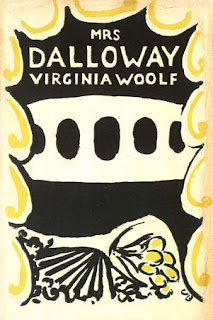Happy Birthday to Virginia Woolf
When one was young, said Peter, one was too much excited to know people. Now that one was old, fifty-two to be precise (Sally was fifty-five, in body, she said, but her heart was like a girl’s of twenty); now that one was mature then, said Peter, one could watch, one could understand, and one did not lose the power of feeling, he said. No, that is true, said Sally. She felt more deeply, more passionately, every year. It increased, he said, alas, perhaps, but one should be glad of it — it went on increasing in his experience.
--Virginia Woolf,
Mrs. Dalloway
Today is Virginia Woolf's 129th birthday. Woolf is one of my touchstone writers, a writer I've been reading for the majority of my life (really, I first tried to read Mrs. Dalloway in middle school -- I didn't get too far, but I found the first pages of the book utterly entrancing, and by the time I read it fully for the first time eight or nine years later, I had those pages nearly memorized). I've read all of Woolf's novels at least once, and Mrs. Dalloway, To the Lighthouse, and Orlando many times. They are magic poetry.
I've known a couple of Woolf scholars over the years, and one of the things that made me a lifelong Woolf devotee was working at the 7th International Virginia Woolf Society Conference when it was held in my hometown of Plymouth, NH. I had only read Mrs. Dalloway and Orlando at that point, but I found the conference invigorating. I even coerced Hermione Lee into signing my copy of her brilliant biography while I signed her in. The next fall, I took an undergraduate course devoted to Woolf's work; I was the only male in the class, and some of the other students thought my passion for Woolf's writings was a little weird. "You don't understand!" I remember telling one of them when we happened to find ourselves sitting together on a bus. "There's nobody like her! Those sentences!" It was hardly one of my more eloquent moments, and probably led to me being considered weirder than I already was, but nonetheless the passion was real. (I had a similar, though I hope slightly more informative, moment this past term when I spent 10 minutes taking a class of writing students through one of the sentences in "The Death of the Moth." I wrote the sentence on the board, broke it into some components, talked with great enthusiasm about it and the genius of it ... and after class went to my department head and said, "Do you ever get really into something you're doing in class, then look at the students and think, 'Wow, I really am a freak.'" And she replied, "Yes, it's the foundation of my pedagogy.")
I knew Anne Fernald as a blogger before I knew she was a Woolf scholar, though she had been at the Plymouth conference. We used to hang out together at the LitBlog Co-op, and when I first moved to New Jersey, she gave me a tour of Jersey City and environs. Anne is editing an edition of Mrs. Dalloway for Cambridge University Press, work that has consumed her for a few years, and though I don't envy her the tedium of some of that work, I do envy her getting to study all sorts of editions of the novel, to see it in all its permutations, to trace its meanings and influences. If I can find a line where they're selling her edition when it is released, I will force my way to the front.
Anyway, what I wanted to say here was that a talk Anne gave at The New York Public Library about her work on Mrs. Dalloway is now available as a podcast. It's fascinating stuff (well, to those of us who love Mrs. Dalloway) and a fine way to spend an hour during Woolf's birthday.
